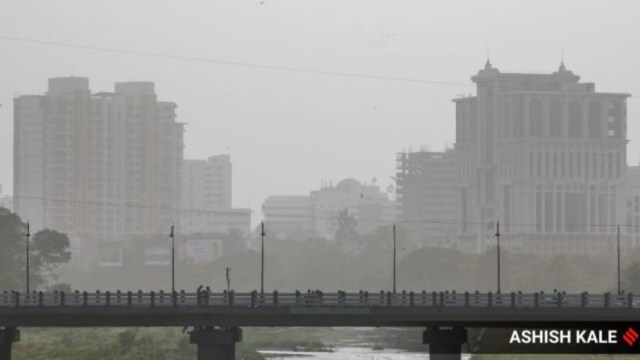Click here to join Express Pune WhatsApp channel and get a curated list of our stories
Hyperlocal monitoring finds critical pollution hotspots in Pune, Pimpri-Chinchwad
The report leverages data from the Google Maps Air Quality API, part of Google Air View+, and the AtlasAQ platform
 PM2.5 – particulate matter less than 2.5 microns in diameter – is a leading contributor to respiratory and cardiovascular illnesses, severely affecting public health.
PM2.5 – particulate matter less than 2.5 microns in diameter – is a leading contributor to respiratory and cardiovascular illnesses, severely affecting public health. A climate-tech startup released a report Friday that revealed critical pollution hotspots in Pune and Pimpri-Chinchwad, with PM2.5 levels in some areas significantly exceeding the national safety standards.
The report leverages data from the Google Maps Air Quality API, part of Google Air View+, and the AtlasAQ platform.
PM2.5 – particulate matter less than 2.5 microns in diameter – is a leading contributor to respiratory and cardiovascular illnesses, severely affecting public health.
“The aim of the report was to highlight pollution trends across 10 major cities in India using hyperlocal monitoring techniques from November 1-30, this year,” Ronak Sutaria, founder and CEO of climate-tech startup Respirer Living Sciences, said.
The report provides a 500×500 metre resolution of air quality trends. These innovative technologies revealed pollution patterns offering actionable insights for policymakers, urban planners, and citizens, Sutaria pointed out.
Vehicular congestion, urban construction, and rapid industrialisation were identified as major contributors to the pollution hotspots in both Pune and Pimpri-Chinchwad. In Pune, Revenue Colony (Shivajinagar), Hadapsar, and Transport Nagar-Nigdi emerged as critical pollution zones, with PM2.5 levels ranging between 60-100 µg/m³ in affected areas. Meanwhile, in Pimpri-Chinchwad – Thergaon, Savta Mali Nagar, and Gavalinagar recorded PM2.5 levels in excess of 115 µg/m³.
According to Professor Sachchida Nand Tripathi, Chair, Steering Committee, National Clean Air Programme (NCAP), hyperlocal air quality monitoring bridges the gap between traditional broad-scale assessments and the localised realities of air pollution. “By providing fine-grained, real-time data, this approach enables us to pinpoint pollution sources with accuracy and design targeted interventions that can improve public health outcomes,” he said.
MPCB, district collector urged to refrain from permitting RMC plants, brick kilns
Shekhar Singh, Commissioner, Pimpri-Chinchwad Municipal Corporation, said that agencies like civic administrations, PMRDA, and others will have to work together to improve air quality. “As a preventive measure, we have written to the district collector and Maharashtra Pollution Control Board authorities to stop permitting new Ready Mix Concrete (RMC) plants and brick kilns. The dust from RMC plants can settle on neighbouring buildings, residences, and even water sources impacting health. Measures under the Graded Response Action Plan (GRAP) to tackle air pollution have already been taken up. At PCMC, we have 35 air quality analyzers as part of the monitoring activity,” he said.
Mangesh Dighe, Environment Officer, Pune Municipal Corporation, said two more air quality monitors were being added to the existing 13 to detect and report specific air pollutants.
Click here to join Express Pune WhatsApp channel and get a curated list of our stories








